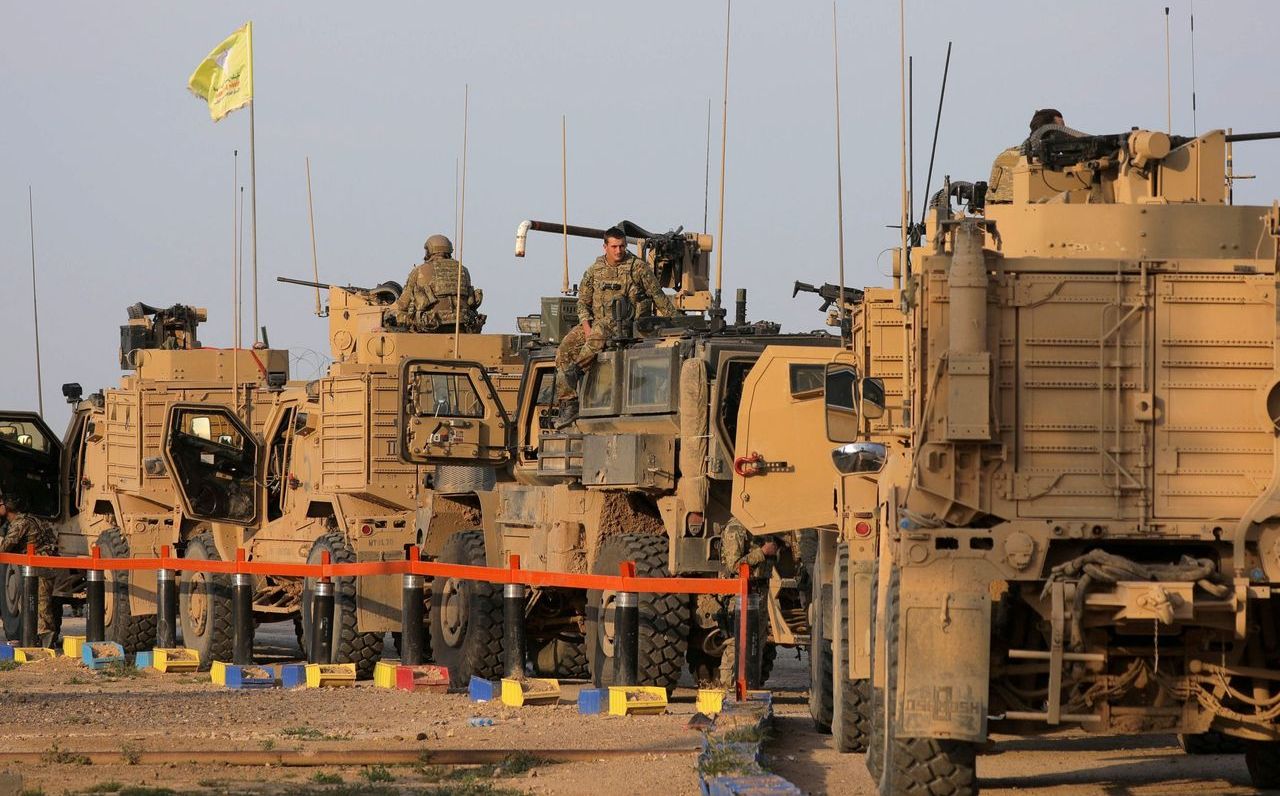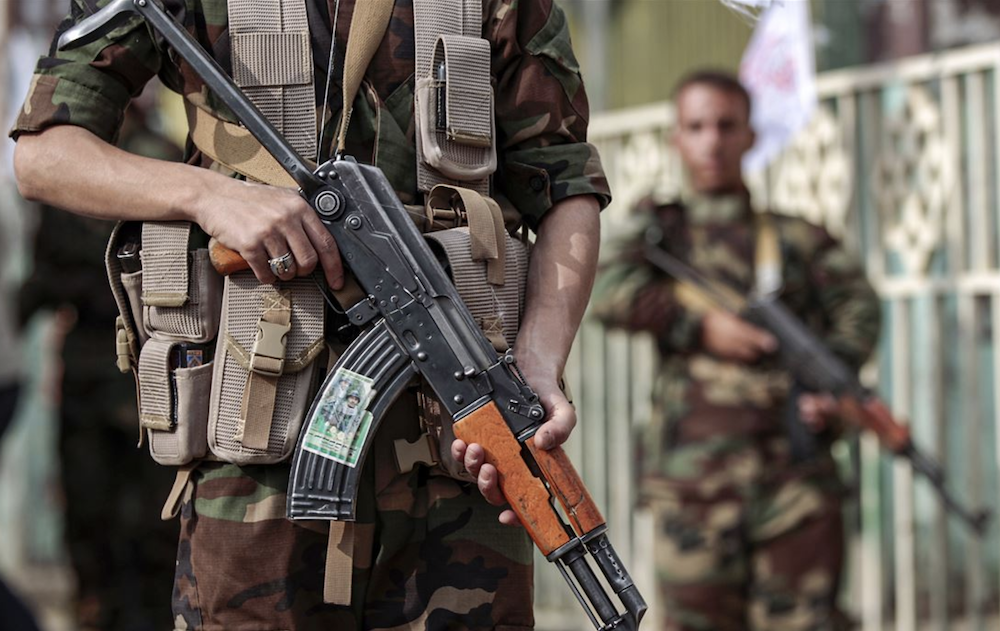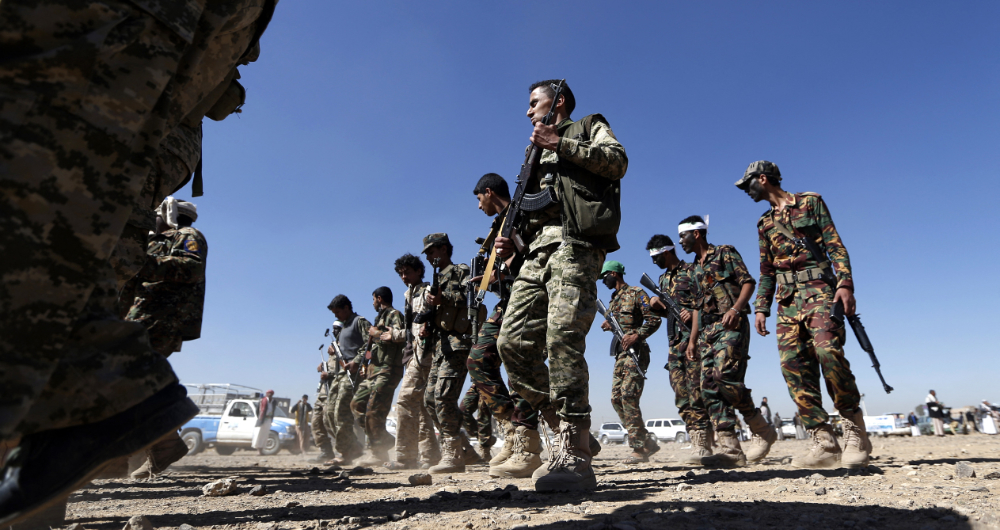A new study on the Middle East takes the wraps off Iran’s militia doctrine
LONDON: As the smoke cleared on another Houthi terrorist attack in Saudi Arabia, this time a drone attack on the Kingdom’s Abha airport, new details emerged about the extent of Iran’s campaign of violence across the Middle East.
The Houthis claimed to use four drones in Wednesday’s attack, which followed days of escalating aggression from the Iran-backed terror outfit. Meanwhile, a new report from the Tony Blair Institute for Global Change (TBI) has warned that Iran-backed militias throughout the region are growing in size, scale and lethality.
The paper — titled “The View from Tehran: Iran’s Militia Doctrine” — exposes the vast network of violent organizations supported by the regime.
With new evidence and a sweeping analysis, it details the militias supported by Iran’s Islamic Revolutionary Guard Corps (IRGC), the fastest-growing form of Tehran-backed proxy terrorist outfits in the Middle East.
It goes on to argue that militias supported, trained and supplied by the IRGC pose the greatest threat to regional stability.

One of the report’s co-authors, Professor Saeid Golkar, a senior fellow at the TBI and an assistant professor in the department of political science and public service at the University of Tennessee at Chattanooga, said that the IRGC-backed militias pose a unique danger to the Middle East.
Unlike the relationships between Tehran and its grassroots militias, which tend to be limited to shared tactical and material interests, the IRGC’s links with its proxies are rooted in a radicalized shared worldview, with these groups fully adopting Tehran’s ideology of Wilayat Al-Faqih, which grants Iran’s supreme leader absolute authority over Shiite Muslims.
This fervent ideological and religious affiliation means that Tehran can expect undying dedication to its deadly causes from groups aligned with the IRGC.
To consolidate these links, Tehran uses the IRGC to heavily invest in the radicalization and indoctrination of militants, gathering resources and support from the regime’s so-called soft-power institutions in the diplomatic, humanitarian, educational and cultural areas.
In Yemen, where the Iran-backed Houthis are waging war against the internationally recognized government, there is evidence that the IRGC’s Quds Force — the branch that deals with unconventional warfare, psychological operations and military intelligence — is training Yemeni Shiite Muslims into adopting its worldview.
In 2014, the Quds Force deployed advisers, mostly from its Lebanese and Iraqi militia groups, to boost the Houthi efforts in consolidating power. Tehran has struggled to bring its authority and teachings over the group, but this has not reduced its efforts.
While the Houthis may not have yet adopted Iran’s interpretation of Wilayat Al-Faqih, they are still following the same pipeline that has led to the creation of some of Tehran’s most-powerful terrorist assets, such as Hezbollah in Lebanon and Asaid Al-Haaq in Iraq.
One of the TBI’s analysts and a co-author of its new report, Kasra Aarabi, told Arab News that Iran has brought hundreds of Yemeni students from Houthi tribes to study at “soft power” institutions in Tehran like Al-Mustafa International University.

According to the report, some of the students have explicitly displayed loyalty to Ali Khamenei, Iran’s supreme leader.
Aarabi told Arab News that this worrying trend could signal a growth in the IRGC’s influence over Yemen’s Shiite Muslims, leading to further terrorist operations in the troubled country.
He warned that “sanctions relief will not be enough to stop IRGC-aligned groups. Their fighters are radicalized, they will fight regardless of access to material reward. We need to counter these groups the same way that we would when facing Sunni Islamist extremists.”
Aarabi added that only a “full-scale hearts and minds approach with counterinsurgency strategies” will deal with these militias. Military solutions are not enough, he argued, governments will also need to challenge the ideology behind them.
“You need to adopt this approach to properly constrain them, starting from the root of the problem and pushing back the ideas that drive the violence,” he said.
Golkar shared his fellow report author’s view, arguing that the dominant Western approach to countering IRGC-supported groups has been insufficient.
“There is a popular joke in Iran,” Golkar told Arab News, “that a couple are sleeping at home, they hear a noise in their apartment, the woman asks him to check what is happening, but the husband is scared of dealing with the reality and he says ‘inshallah, it is just a cat, go back to sleep’ — this has been the dominant approach of Western policymakers dealing with the IRGC.”

He added: “They are scared of what is happening, so they just say ‘it is a cat’, and that the IRGC is just a conventional military. But they are wrong. We need an approach that deals with the IRGC, the Quds Force and its militias by recognizing the reality of the extent of their reach.”
Golkar said perceptions had to change in the West to understand the extent of the IRGC’s influence. “Understanding the reality is vital, if you deny what is happening you cannot deal with it,” he said. “The second approach is the tactical response. We have to know how these militias are aligned with Tehran and how much they comply with the regime.”
Aarabi said “the militia doctrine has been designed to outlive the regime in Tehran. Even if the Islamic Republic collapsed, the IRGC has built an infrastructure across the region and this militia doctrine can go into a full insurgency mode. It can outlive the Islamic Republic, and this needs to be considered when policymakers design strategies to stem the problem.”
The extent of Iran’s nexus of evil is vast. The TBI identified 194 IRGC operations across 51 countries and five continents since 1979. With the first interactive tracker of the IRGC’s global footprint, analysts can for the first time observe a total depiction of Tehran’s wide-reaching violent operations.
Golkar and Aarabi challenged the view that Tehran is only supporting these groups as a deterrent. Aarabi said: “The argument goes that if relations improve with the US and if sanctions are lifted, then the regime will feel less threatened and it will reduce its support for these groups.
“But our research totally contradicts this view. Many of these militias have embraced the IRGC’s ideology; they do not even recognize the territorial borders of Iran.”
He added: “These are not conventional forces defending the state of Iran. They are for the division of the world between the land of Muslims and the land of infidels.
“Easing sanctions will not work. Just 13 days after the nuclear deal was signed, Khamenei rejected the idea that any material incentive would cut Iran’s support for regional militias. As sanctions were being eased, we saw a surge in the militias and the manufactured IRGC groups.”

In secret recording, Iran’s FM says downing of Ukraine flight could have been intentional



